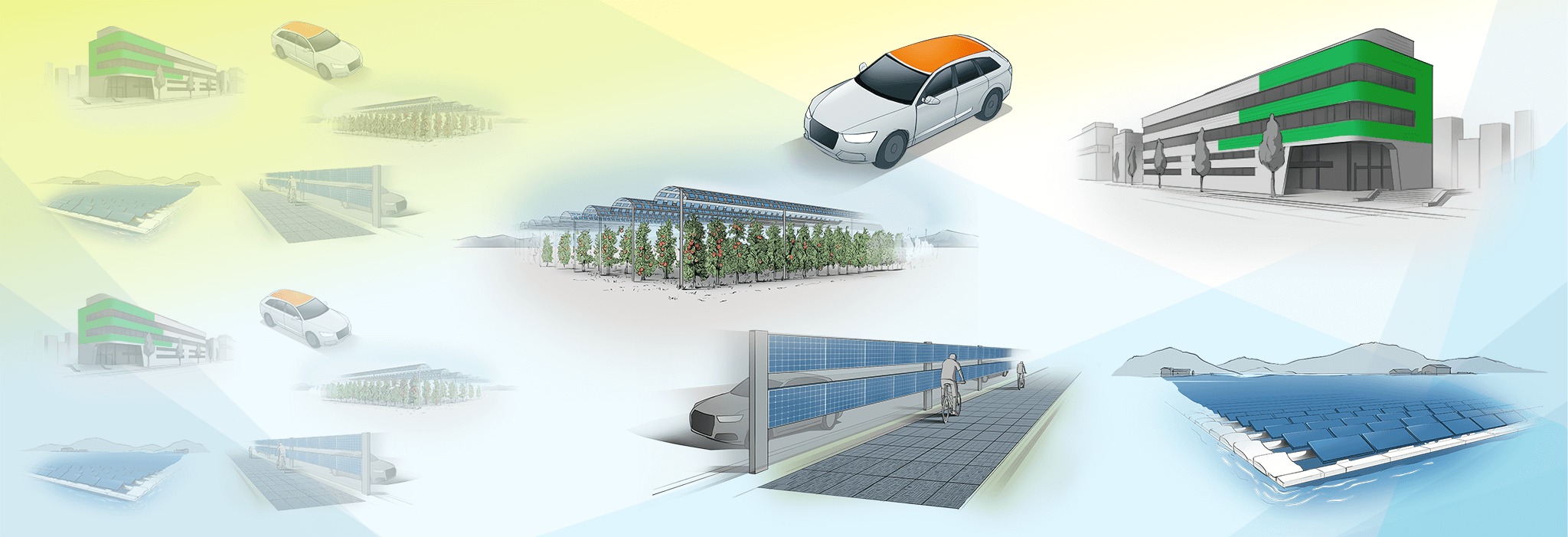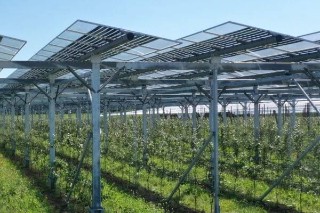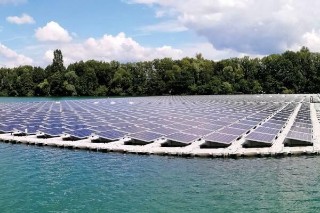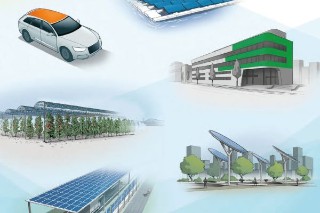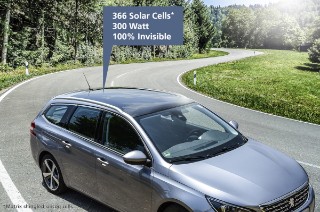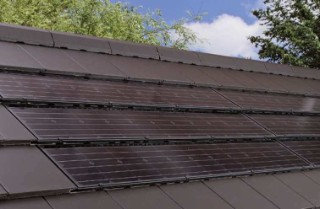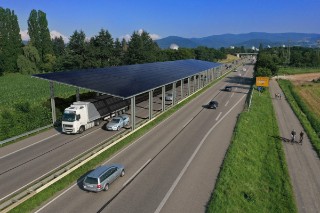Jahr
Year | Titel/Autor:in
Title/Author | Publikationstyp
Publication Type |
|---|
| 2025 |
Performance evaluation of predictive models for a Grid-Connected Building-Integrated photovoltaic system (BIPV)
Jazouli, Soukaïna; Wilson, Helen Rose; Kapsis, Costa |
Zeitschriftenaufsatz
Journal Article
|
| 2025 |
Modelling, simulation, and optimisation of agrivoltaic systems: a comprehensive review
Zainali, Sebastian; Ma Lu, Silvia; Fernández-Solas, Álvaro; Cruz-Escabias, Alejandro; Fernández, Eduardo F.; Zidane, Tekai Eddine Khalil; Hustad Honningdalsnes, Erlend; Nygård, Magnus Moe; Leloux, Jonathan; Berwind, Matthew; Trommsdorff, Maximilian; Amaducci, Stefano; Gorjian, Shiva; Campana, Pietro Elia |
Zeitschriftenaufsatz
Journal Article
|
| 2025 |
Optimizing aesthetic appearance of perovskite solar cells using color filters
Schaible, Jonas; Winarto, Hanifah; Škorjanc, Viktor; Yoo, Danbi; Zimmermann, Lea; Jäger, Klaus; Sekulic, Ivan; Schneider, Philipp-Immanuel; Burger, Sven; Wessels, Andreas; Bläsi, Benedikt; Becker, Christiane |
Zeitschriftenaufsatz
Journal Article
|
| 2025 |
International inter-laboratory comparison of solar heat gain coefficient of building-integrated photovoltaic modules - Results of tests with or without power generation and tests with PV cell coverage ratios
Ishii, Hisashi; Wilson, Helen Rose; Hagihara, Shinji; Amann, Ulrich; Shabunko, Veronika; Boddaert, Simon |
Zeitschriftenaufsatz
Journal Article
|
| 2025 |
GIS-based potential analysis and agro-economic site selection for agrivoltaics using AHP in two German counties
Hauger, Salome; Gudat, Charlotte; Lieb, Vanessa; Glaser, Rüdiger J. |
Zeitschriftenaufsatz
Journal Article
|
| 2025 |
Enhancing agrivoltaic synergies through optimized tracking strategies
Bruno, Maddalena; Gfüllner, Leonhard Josef; Berwind, Matthew |
Zeitschriftenaufsatz
Journal Article
|
| 2025 |
Optics for terawatt-scale photovoltaics: review and perspectives
Jäger, Klaus; Aeberhard, Urs; Alarcon Llado, Esther; Bläsi, Benedikt; Burger, Sven; Ehrler, Bruno; Favre, Wilfried; Fejfar, Antonin; Gageot, Tristan; Gordon, Ivan; Helmers, Henning; Höhn, Oliver; Izabella, Olindo; Jost, Marko; Ledinsky, Martin; Mandal, Jyotirmoy; Manley, Phillip; Munoz, Delfina; Omair, Zunaid; Ortiz Lizcano, Juan Camilo; Paetzold, Ulrich W.; Raman, Aaswath P.; Sai, Hitoshi; Saive, Rebeca; Schmid, Martina; Yablonovitch, Eli; Becker, Christiane |
Zeitschriftenaufsatz
Journal Article
|
| 2025 |
Ein praxisbezogener, systematischer Ansatz für die Integration der BIPV-Planung in den Bauplanungsprozess
Wilson, Helen Rose; Ensslen, Frank; Mühlich, Mona; Kuhn, Tilmann; Bueno Unzeta, Bruno; Balog, Valentin |
Konferenzbeitrag
Conference Paper
|
| 2024 |
Design of periodic dielectric multilayer thin films for colorizing PV panels
He, Tangyue; Ma, Tao; Bläsi, Benedikt; Li, Zhenpeng; Li, Sinan; Chen, Yuning |
Zeitschriftenaufsatz
Journal Article
|
| 2024 |
AgriChance. Agri-PV als Chance für Landwirtschaft und Energiewende in Hamburg - Entscheidungshilfevorhaben zur Darlegung des Potenzials, der ökonomischen Betrachtung und energetischen Integration
Hauger, Salome; Bieber, Lisa-Marie; Schürmer, Tarek; Lieb, Vanessa; Trötsch, Helen; Torres Boggio, Alexa Aldana; Hopf, Michaela; Rößner, Johanna-Viktoria; Böhm, David; Grolik, Sebastian; Hecker, Pauline |
Bericht
Report
|
| 2024 |
Multi-dimensional evaluation of BIPV installations: Development of a tool to assess the performance as building component and electricity generator
Wilson, Helen Rose; Frontini, Francesco; Bonomo, Pierluigi; Eder, Gabriele C.; Babin, Markus; Thorsteinsson, Sune; Adami, Jennifer; Maturi, Laura; Yang, Rebecca Jing; Weerasinghe, Nilmini; Martin-Chivelet, Nuria; Boddaert, Simon; Frischknecht, Rolf |
Zeitschriftenaufsatz
Journal Article
|
| 2024 |
Enabling Silver-Free Metallization of the Rear Side of iTOPCon Cells Through Laser Bonding of Thin Aluminum Foil
John, Oliver; Ourinson, Daniel; Emanuel, Gernot; Brand, Andreas; Nekarda, Jan; Preu, Ralf |
Vortrag
Presentation
|
| 2024 |
Assessing the impact of overhead agrivoltaic systems on GNSS signal performance for precision agriculture
Vélez, Sergio; Valente, João; Bretzel, Tamara; Trommsdorff, Maximilian |
Zeitschriftenaufsatz
Journal Article
|
| 2024 |
Economic performance of agrivoltaic systems: a comprehensive analysis
Trommsdorff, Maximilian; Nekolla, Jakob; Schwendemann, Niklas Viktor; Zafar Butt , Nauman; Feuerbacher, Arndt |
Aufsatz in Buch
Book Article
|
| 2024 |
Thermal effect of VIPV modules in refrigerated trucks
Alanis, Luis Eduardo; Velte-Schäfer, Andreas; Jajoo, Nishant; Schüler, Marc Andre; Rendler, Li Carlos; Neuhaus, Holger; Heinrich, Martin |
Zeitschriftenaufsatz
Journal Article
|
| 2024 |
Wandel spielerisch erleben: Das digi.farming.lab als Agri-PV-Demonstrator zur Förderung der Agrar- und Energiewende
Wanta, Helge; Kollersberger, Tanja; Zoll, Felix; Wilke, Agnes Katharina; Porepp, Katharina; Schneider, Hendrik |
Konferenzbeitrag
Conference Paper
|
| 2024 |
Glass Textures for Photovoltaic Modules - an Overview
Bläsi, Benedikt |
Vortrag
Presentation
|
| 2024 |
MorphoFlex: Integrating MorphoColor on Polymeric Films in Photovoltaic Modules
Bläsi, Benedikt; Mattenheimer, Martin; Wellens, Christine; Markert, Jochen; Wessels, Andreas; Hauser, Hubert; Mick, Jörg; Fels, leon; Kindle-Hasse, Brunhilde; Kroyer, Thomas |
Poster
|
| 2024 |
Component-based SHGC determination of BIPV glazing for product comparison
Wilson, Helen Rose; Kuhn, Tilmann; Ishii, Hisashi; Valencia-Caballero, Daniel; Martin-Chivelet, Nuria; Peng, Jinqing; Yang, Rebecca Jing; Zang, Yukun; Ge, Hua; Ye, Kai; Jonsson, Jacob C.; Kapsis, Konstantinos |
Zeitschriftenaufsatz
Journal Article
|
| 2024 |
SolarEnvelopeCenter - Planungsunterstützung für die Solarisierung der Gebäudehülle im Neubau und Bestand
Wilson, Helen Rose; Ensslen, Frank; Kuhn, Tilmann; Membarth, Richard; Luft, Christian; Balog, Valentin; Babetzki, Kai; Dilthey, Baldur; Geier, Sebastian; Jung, Oliver; Sting, Joachim; Haselhuhn, Ralf |
Konferenzbeitrag
Conference Paper
|
| 2024 |
Factors influencing the willingness to use agrivoltaics: A quantitative study among German farmers
Wagner, Johanna Eva Luise; Bühner, Charlotte; Gölz, Sebastian; Trommsdorff, Maximilian; Jürkenbeck, Kristin |
Zeitschriftenaufsatz
Journal Article
|
| 2024 |
APyV: Designing Agrivoltaic Facilities Considering Crop Needs
Gfüllner, Leonhard Josef; Amelung, Kawan; Bruno, Maddalena; Gerber, Simone; Berwind, Matthew |
Vortrag
Presentation
|
| 2024 |
MorphoFlex: A Film Based Implementation of the MorphoColor Concept for Colored Photovoltaic Modules
Bläsi, Benedikt; Mattenheimer, Martin; Wessels, Andreas; Wellens, Christine; Markert, Jochen; Reinwand, Dirk; Hauser, Hubert; Mick, Jörg; Fels, Leon; Kindle-Hasse, Brunhilde; Kroyer, Thomas |
Vortrag
Presentation
|
| 2024 |
Floating Photovoltaic in Chile: Potential for Clean Energy Generation and Water Protection
Jung, David; Schönberger, Frederik; Moraga, Francisco; Ilgen, Konstantin; Wieland, Stefan |
Zeitschriftenaufsatz
Journal Article
|
| 2023 |
Chancen und Herausforderungen von Parkplatz-PV
Haider, Fritz; Eisenlohr, Johannes |
Vortrag
Presentation
|
| 2022 |
Softwareunabhängig-verlustfreie Projektdatenumgebung und föderal-selbstbeschreibende parametrische Modellierung multifunktionaler Bauprodukte auf Basis des Semantic Web mit Fokus auf die Gebäudehülle. Schlussbericht
Maurer, Christoph; Rist, Tim; Kuhn, Tilmann; Shi, Meiling; Huyeng, Tim-Jonathan; Hoffmann, André; Thiele, Christian-Dominik; Rüppel, Uwe; Sprenger, Wendelin |
Bericht
Report
|
| 2022 |
Progress and Challenges of Crop Production and Electricity Generation in Agrivoltaic Systems Using Semi-transparent Photovoltaic Technology
Gorjian, S.; Bousi, Erion; Özdemir, Özal Emre; Trommsdorff, Maximilian; Manoj Kumar, N.; Anand, A.; Kant, K.; Chopra, S.S. |
Zeitschriftenaufsatz
Journal Article
|
| 2022 |
Building Product Ontology: Core Ontology for Linked Building Product Data
Wagner, A.; Sprenger, Wendelin; Maurer, Christoph; Kuhn, Tilmann E.; Rüppel, U. |
Zeitschriftenaufsatz
Journal Article
|
| 2022 |
APV-Bot Demonstrator
Fahmy, Karim Mohamed Tamer Mahmoud |
Vortrag
Presentation
|
| 2022 |
Herausforderungen bei der Energiewende
Bett, Andreas W. |
Vortrag
Presentation
|
| 2021 |
The MorphoColor Concept for Colored Photovoltaic Modules
Bläsi, Benedikt; Kroyer, Thomas; Kuhn, Tilmann E.; Höhn, Oliver |
Zeitschriftenaufsatz
Journal Article
|
| 2021 |
Evaluating BIPV Modules with Respect to Textural Appearance, Glare, Colour and Electricity Yield
Wilson, Helen Rose; Bueno Unzeta, Bruno; Eisenlohr, Johannes; Kuhn, Tilmann |
Konferenzbeitrag
Conference Paper
|
| 2021 |
Potential of Agrivoltaics to Contribute to Socio-Economic Sustainability: A Case Study in Maharashtra / India
Trommsdorff, Maximilian; Vorast, Maximilian; Durga, N.; Padwardhan, S. |
Konferenzbeitrag
Conference Paper
|
| 2021 |
Solarstrom als Pfeiler des Energiewandels
Bett, Andreas W. |
Vortrag
Presentation
|
| 2021 |
Proposal for a Safety Qualification Program for Vehicle-Integrated PV Modules
Markert, Jochen; Kutter, Christoph; Newman, B.; Gebhardt, Paul; Heinrich, Martin |
Zeitschriftenaufsatz
Journal Article
|
| 2021 |
PV Manufacturing in Europe. Statements
Bett, Andreas W. |
Vortrag
Presentation
|
| 2021 |
Opening Address EU-PVSEC 2021
Bett, Andreas W. |
Vortrag
Presentation
|
| 2021 |
Aktueller Stand der Forschung/Entwicklung für Gebäudeintegrierte PV
Kuhn, Tilmann |
Vortrag
Presentation
|
| 2021 |
Potenziale der Integrierten Photovoltaik in Deutschland
Wirth, Harry; Eggers, Jan-Bleicke; Trommsdorff, Maximilian; Neuhaus, Dirk Holger; Heinrich, Martin; Wieland, S.; Schill, Christian |
Konferenzbeitrag
Conference Paper
|
| 2021 |
Durchführbarkeitsstudie zur Ermittlung möglicher Forschung- und Demonstrationsfelder für Agri-Photovoltaik in Baden-Württemberg
Hörnle, Oliver; Riedelsheimer, Julia; Trommsdorff, Max; Keinath, Tobias; Binder, Florian; Weinmann, Ernst; Klodt, Frederik; Zikeli, Sabine; Pataczek, Lisa; Rueß, Franz; Köppler, Kirsten; Glas, Michael; Mayr, Ulrich; Frey, Michael; Kromrey, Volker; Vedel, Dimitri; Klein, Alexandra |
Studie
Study
|
| 2021 |
BauwerkIntegrierte PV (BIPV) Stand der Forschung & Entwicklung
Kuhn, Tilmann |
Vortrag
Presentation
|
| 2021 |
Integrating PV: PV where People Live, Work and Farm
Wirth, Harry |
Vortrag
Presentation
|
| 2021 |
Legal Framework of Agrivoltaics in Germany
Vollprecht, Jens; Trommsdorff, Maximilian; Hermann, C. |
Konferenzbeitrag
Conference Paper
|
| 2021 |
Materialinnovationen für die Solarenergie
Bett, Andreas W. |
Vortrag
Presentation
|
| 2021 |
Untersuchung verschattungsoptimierter Halbzellenmodule mit einlaminierter Leistungselektronik für das MPP-Tracking auf Substring-Ebene
Armbruster, Cornelius; Kutter, Christoph; Schmid, A.; Tummalieh, Ammar; Rouffaud, Gilles; Basler, Felix; Wille-Haußmann, Bernhard; Famulla, J.; Schüler, Marc Andre; Oyebanji, U.O. |
Konferenzbeitrag
Conference Paper
|
| 2021 |
Production of Photovoltaics in Europe. Opportunities and Challenges
Bett, Andreas W. |
Vortrag
Presentation
|
| 2021 |
The MorphoColor Concept for Colored Photovoltaic Modules and Solar Thermal Collectors
Bläsi, Benedikt; Wessels, Andreas; Callies, Adrian; Eisenlohr, Johannes; Ensslen, Frank; Kuhn, Tilmann; Kroyer, Thomas; Höhn, Oliver |
Vortrag
Presentation
|
| 2020 |
Bridging two Worlds - Standards for BIPV
Wilson, Helen Rose |
Vortrag
Presentation
|
| 2020 |
Spray Pyrolysis - a Versatile Technique for Thin Film Deposition in PV
Bartsch, Jonas; Heitmann, Ulrike; Jakob, Leonie; Mahmoud Algazzar, R.; Tutsch, Leonard; Hermann, R.; Kluska, Sven; Bivour, Martin; Bläsi, Benedikt; Hauser, Hubert; Janz, Stefan; Glatthaar, Markus |
Konferenzbeitrag
Conference Paper
|
| 2020 |
Colored Modules for Integrated PV: From the MorphoColor-Concept to High Efficiency Prototypes
Bläsi, Benedikt |
Vortrag
Presentation
|
| 2020 |
Implementation of agrophotovoltaics. Techno-economic analysis of the price-performance ratio and its policy implications
Schindele, Stephan; Trommsdorff, Maximilian; Schlaak, A.; Obergfell, Tabea; Bopp, Georg; Reise, Christian; Braun, Christian; Weselek, A.; Bauerle, A.; Högy, P.; Goetzberger, Adolf; Weber, Eicke R. |
Zeitschriftenaufsatz
Journal Article
|
